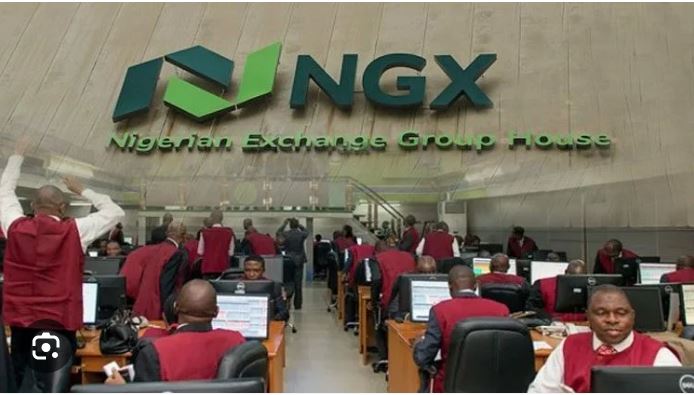1
INVESTDATA
The Nigerian stock market opened the week on a weak footing, with the NGX All-Share Index retreating 0.25 percent to 153,739.11 points as early-week gains were erased. Market capitalisation dropped by N245.88 billion to close at N97.58 trillion, bringing the year-to-date return to 49.37 percent.
The market’s downturn was largely influenced by sell-offs in major stocks such as HONYFLOUR, NNFM, ARADEL, and ACCESSCORP, while UNIONDICON posted gains and HONYFLOUR topped the losers’ chart. UBA emerged as the most traded stock, with 136.84 million shares worth N5.54 billion changing hands.
NGXAASI Daily Index Action

The bearish trend intensified on Tuesday as the All-Share Index fell 0.72 percent to 152,629.60 points, leading to a contraction of N611.96 billion in market capitalisation to N96.97 trillion and reducing year-to-date return to 48.29 percent.
Losses were concentrated in SKYAVN, NASCON, OANDO, NESTLE, and GTCO, while SUNUASSUR led the gainers. SKYAVN recorded the largest decline.
Trading volume was highest in ASOSAVINGS, while STANBIC dominated in value traded.
On Wednesday, the market extended its slump with the AllShare Index shedding 1.35 percent to 150,573.87 points. Market capitalization declined by N1.31 trillion to N95.66 trillion, while year-to-date return slipped to 46.29 percent. TRANSCORP, SKYAVN, BETAGLAS, MTNN, and DANGSUGAR led the losses, as NCR emerged the top gainer and CILEASING recorded the steepest decline. FIDELITYBK dominated both trading volume and value during the session.
Thursday continued the bearish streak, with the All-Share Index losing 0.36 percent to 150,026.55 points.
Market capitalisation fell by N347.75 billion to N95.32 trillion, and the year-to-date return eased to 45.76 percent. BERGER, NAHCO, ETI, and GUINNESS were the main contributors to losses, while UPDC led the gainers. FCMB recorded the highest trading volume, and ZENITHBANK led in value traded.
The week ended on a continued negative note as the All-Share Index fell 0.33 percent to 149,524.81 points.
Market capitalization dropped by N318.78 billion to N95 trillion, with year-to-date return declining to 45.27 percent.
Selling pressure dominated key stocks including BERGER, MECURE, CUSTODIAN, and FIDSON, while NCR recorded the largest gains. WEMABANK registered the highest trading volume and value.
Investors traded a total of 3.575 billion shares worth N107.011 billion in 146,429 deals for the week, down from 7.479 billion shares valued at N145.429 billion exchanged in 159,487 deals the previous week.
Activity was largely concentrated in the Financial Services sector, which accounted for 82.39 percent of total volume and 61.59 percent of total value.
The Services and Consumer Goods sectors followed, with 147.325 million shares worth N1.511 billion and 147.307 million shares valued at N11.195 billion traded, respectively.
Trading in Fidelity Bank Plc, FCMB Group Plc, and Aso Savings & Loans Plc accounted for 36.03 percent of total volume and 18.08 percent of total value traded. By the close of the week, the NGX All-Share Index and market capitalisation had declined 2.99 percent and 2.89 percent, respectively, ending at 149,524.81 points and N94.998 trillion.
NCR Nigeria Plc
Leading the top gainers chart is; NCR Nigeria Plc,a leading technology and financial solutions company in Nigeria, gained 20.94 percent to close at N19.35, Euniseil Interlinked Plc rose 20.17 percent to N70.90, Union Dicon Salt Plc increased 9.93 percent to N7.75, Honeywell Flour Mill Plc added 9.50 percent to N21.90, and UPDC rose 6.81 percent to N6.59.
Sovereign Trust Insurance Plc

On the decliners chart is; Sovereign Trust Insurance Plc,a Nigerian insurance company primarily engaged in providing life and non-life insurance products to individuals, businesses, and corporate clients.
Its offerings include life insurance policies, general insurance, health insurance, and group schemes, fell 28.21 percent to N2.80, C & I Leasing Plc declined 20.16 percent to N5.03, Skyway Aviation Handling Company Plc shed 18.99 percent to N80.60, Berger Paints Plc dropped 17.41 percent to N35.10, and International Energy Insurance Plc lost 17.01 percent to N2.44.
The week’s trading reflected sustained investor caution as profit-taking dominated across key financial, industrial, and consumer stocks.
With four consecutive sessions of declines, the market concluded the week on a defensive note, leaving investors attentive to potential catalysts in the coming sessions.
NGXASI Weekly Index Action

Week-to-date, the All-Share Index has decreased by 2.99%, with the NGX 30 falling by 3.00%.
The Banking Index posted a loss of 3.85%, the Pension Index decreased by 4.04%, the Insurance Index decreased by 7.56%, and the Consumer Goods Index decreased by 2.54%. Oil and Gas Index decreased by 4.80%.
On a year-to-date basis, the All-Share Index is up 45.27%, while the NGX 30 has gained 43.80%, the Banking Index surged 30.00%, the Pension Index jumped 48.71%, the Insurance Index rose 58.51%, and the Consumer Goods Index posted a robust 98.91% increase. However, the Oil and Gas Index inclined by 2.25%. Market breadth is negative, with 20 stocks advanced and 75 declined.
Technical Analysis
The Nigerian stock market ended the week under sustained pressure, with the NGX All-Share Index closing at 149,524.81 points, down 2.99% for the week.
Technical indicators suggest the market is approaching a key support level around 149,000 points, which may act as a short-term floor for further declines.
Resistance is observed near 150,500 to 151,000 points, where selling pressure has historically intensified.
The Relative Strength Index points to mildly over sold conditions, implying that the market could see a pause or slight rebound, while the MACD remains in negative territory, confirming ongoing bearish momentum.
Trading activity moderated during the week, with 3.575 billion shares exchanged compared to 7.479 billion shares in the previous week, reflecting cautious investor participation amid consistent profit-taking. Sectoral performance contributed significantly to the overall decline, with the Banking, Insurance, and Consumer Goods indices posting losses of 3.85%, 7.56%, and 2.54% respectively, while financial stocks accounted for the bulk of trading activity.
Market Outlook
Looking forward, the market is likely to remain cautious in the near term as investors weigh domestic economic developments, including reforms aimed at boosting private-sector growth, alongside global factors such as oil price movements, U.S. Treasury yields, and volatility in technology stocks.
The index may test its support zone, providing potential consolidation before any meaningful recovery. Positive news from corporate earnings or policy reforms could act as catalysts for a rebound, but sustained selling pressure and global uncertainties may continue to influence sentiment.
Investors are expected to maintain a defensive stance, focusing on technical support levels and monitoring key sectors for opportunities as the market navigates this bearish phase.
Trending in the Economy: Nigeria is negotiating a $1 billion World Bank loan to boost private investment, create jobs, and diversify the economy.
The funding—split between IDA and IBRD—will support reforms to expand credit access, strengthen digital finance, lower business costs, and improve agriculture. It aims to drive private-sector growth, curb inflation, and enhance food security.
The Nigerian Railway Corporation plans to switch to electric trains within five years under its “Vision 2-5- 10-20” plan, which targets network expansion to 60,000 km over 20 years.
Currently, only the Lagos Blue Line is electric, with further extensions and a national railway roadmap in progress to connect all states and ease road congestion.
Global Market and Oil: The Nasdaq closed slightly lower on Friday, wrapping up its worst weekly drop since early April as investors questioned the durability of the recent rally in artificial intelligence stocks.
Tech and chip shares were hit hardest, with the Nasdaq losing about 3% for the week. Despite this pullback, the index remains up more than 50% since April, driven by AI optimism and policy shifts following U.S. President Donald Trump’s tariff announcements.
Market sentiment turned cautious after reports from The Financial Times cited Nvidia CEO Jensen Huang warning that China could surpass the U.S. in AI development.
Analysts said investors were recalibrating valuations and locking in profits after a strong year for tech shares.
Elsewhere, Bitcoin fell for the week but rose 2.09% on Friday to $103,197.07. The Dow Jones Industrial Average climbed 74.80 points, or 0.16%, to 46,987.10; the S&P 500 gained 8.49 points, or 0.13%, to 6,728.81; while the Nasdaq Composite slipped 49.45 points, or 0.21%, to 23,004.54.
Globally, the MSCI World Index edged down 0.07%, and Europe’s STOXX 600 lost 0.55% after weaker-than-expected Chinese trade data showed exports dropping 1.1% in October, the sharpest fall since February — highlighting the toll of U.S. tariffs.
U.S. Treasury yields eased slightly as consumer sentiment weakened amid the ongoing government shutdown.
The University of Michigan’s survey showed sentiment falling to 50.3 in November, the lowest since June 2022. The 10-year Treasury yield dipped to 4.091%.
The dollar weakened against major currencies, with the dollar index down 0.11% to 99.57. The euro rose to $1.1563, while the yen slipped to 153.45 per dollar.
Oil prices rebounded late in the session as U.S. President Trump met Hungary’s Prime Minister Viktor Orban, with hopes of renewed crude cooperation. U.S. crude rose 32 cents to $59.75 a barrel, Brent gained 25 cents to $63.63, and gold prices also advanced.



